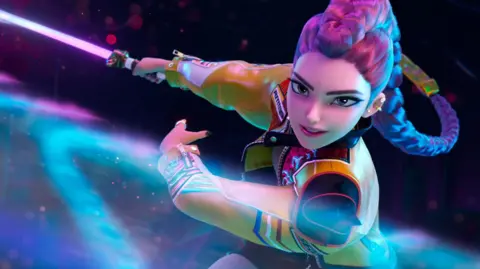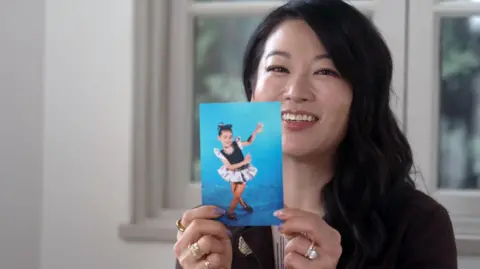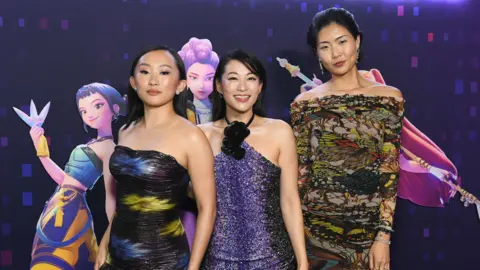
This is part of the Global Women series from the BBC World Service, sharing extraordinary interviews and stories from around the globe.
“I hated that I looked Asian, that I didn’t have blue eyes and blonde hair, because that’s what was beautiful at the time,” says Arden Cho, the actress who voiced Rumi, star of Netflix’s chart-topping animated film, KPop Demon Hunters.
Cho, 40, is describing her childhood in Texas, as the eldest daughter of Korean immigrant parents and her struggle for acceptance in American society.
In the film, which tells the story of a female K-Pop trio who must save the world from evil forces, Rumi has to come to terms with her identity as part human, part demon – and when Cho first read the script this resonated powerfully.
“Being born in America, feeling American but having people treat me like I’m not, trying to figure out my identity as an Asian-American, as a Korean-American, as a woman,” she says.
These were all elements of her early life that mirrored Rumi’s journey.
“I can honestly say that at different points in my life, I hated a lot of myself and I wanted to be someone else.
“As kids, what you see shapes who you become and I feel like I just didn’t see enough people that look like me.”

When it launched on Netflix in June, KPop Demon Hunters registered 33 million views in just two weeks and reached the top 10 of the Netflix charts in 93 countries. To star in the first Hollywood animated film set in Korea, with Korean leads, was for Cho “a dream come true” – but it has also made her a powerful role model for Asian-American children, of the kind that she lacked when she was young.
Cho says many Korean-Americans have told her it’s “such a refreshing moment”, making them proud for the first time of their dual heritage and culture.
“I feel like K-pop really, truly, has paved the way. K-beauty has had such a big impact on Korea, being loved. But I feel like this movie is the one that tipped it over the edge of, everybody wants to go to Korea, now,” Cho says.
But the film’s success was not guaranteed and Cho says she felt the team making it were “sometimes facing an uphill battle”.
“I feel like it kind of sucks to say this, but any time there’s an Asian-led project, people feel like it’s a risk,” she says.
So, when she took on the role, she made an effort to meet everyone working on the film in person, she says.

The film was released against the backdrop of increased immigration raids in the US as part of the Trump administration’s mass deportation effort, which sparked protests in many states.
As an Asian-American living in the US “it’s heartbreaking and disappointing,” says Cho. “Immigrants have made America what it is.”
Korean news sources have estimated that up to 150,000 Korean immigrants without proper documentation, including adopted children, are among those who could be deported.
As an adult, Cho came to realise that the racism she had experienced when she was younger stemmed mainly from a lack of education, as people didn’t know what it meant to be Korean or Asian.
“But now in this day and age, when I feel like the world and people should know better, it is beyond disappointing and sometimes I feel like we feel so hopeless,” she says.
Because of this, it feels very special, she says, that KPop Demon Hunters could bring “hope and joy and love to all these different communities”.
“Maybe that’s why it’s sort of like this movie of the summer, because we just needed some hope and something to unite us all together.”

The growth of AI is a major concern for the film industry, raising the possibility that in future it could be used to make a film like KPop Demon Hunters.
Cho says she is aware that AI is already being used to replicate actors’ voices, but wants to “have hope in humanity” that people will still seek out art created by humans.
“Sure, I’m sure they’re going to have AI actors and singers. I know they already exist. I know our voices are already being manipulated, but I hope people have some respect and want and love for something real.”
KPop Demon Hunters has also been dominating the global music charts, with seven tracks from its soundtrack featured on the Billboard Hot 100. It has its own fan art, and audiences around the world are demanding a sequel.
Cho tells us she wishes she could answer the question of whether that will happen, but both she and fans will have to wait for Netflix or Sony Pictures Entertainment, which made the film, to give it the green light.
“I know there’s lots of murmurs, I’ve heard wonderful things,” she says. “So we shall see, and I think everyone in the world would riot if there wasn’t.”